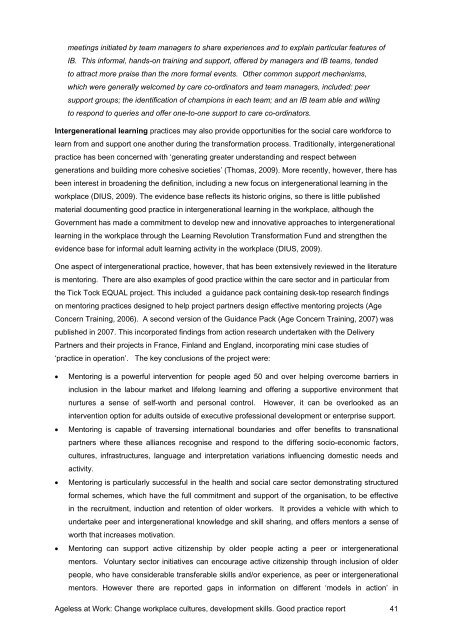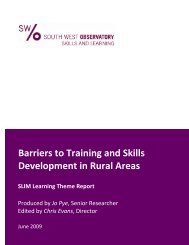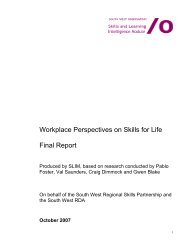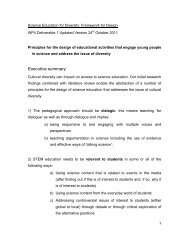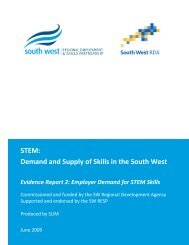Ageless at Work - Skills for Care
Ageless at Work - Skills for Care
Ageless at Work - Skills for Care
Create successful ePaper yourself
Turn your PDF publications into a flip-book with our unique Google optimized e-Paper software.
meetings initi<strong>at</strong>ed by team managers to share experiences and to explain particular fe<strong>at</strong>ures of<br />
IB. This in<strong>for</strong>mal, hands-on training and support, offered by managers and IB teams, tended<br />
to <strong>at</strong>tract more praise than the more <strong>for</strong>mal events. Other common support mechanisms,<br />
which were generally welcomed by care co-ordin<strong>at</strong>ors and team managers, included: peer<br />
support groups; the identific<strong>at</strong>ion of champions in each team; and an IB team able and willing<br />
to respond to queries and offer one-to-one support to care co-ordin<strong>at</strong>ors.<br />
Intergener<strong>at</strong>ional learning practices may also provide opportunities <strong>for</strong> the social care work<strong>for</strong>ce to<br />
learn from and support one another during the trans<strong>for</strong>m<strong>at</strong>ion process. Traditionally, intergener<strong>at</strong>ional<br />
practice has been concerned with ‘gener<strong>at</strong>ing gre<strong>at</strong>er understanding and respect between<br />
gener<strong>at</strong>ions and building more cohesive societies’ (Thomas, 2009). More recently, however, there has<br />
been interest in broadening the definition, including a new focus on intergener<strong>at</strong>ional learning in the<br />
workplace (DIUS, 2009). The evidence base reflects its historic origins, so there is little published<br />
m<strong>at</strong>erial documenting good practice in intergener<strong>at</strong>ional learning in the workplace, although the<br />
Government has made a commitment to develop new and innov<strong>at</strong>ive approaches to intergener<strong>at</strong>ional<br />
learning in the workplace through the Learning Revolution Trans<strong>for</strong>m<strong>at</strong>ion Fund and strengthen the<br />
evidence base <strong>for</strong> in<strong>for</strong>mal adult learning activity in the workplace (DIUS, 2009).<br />
One aspect of intergener<strong>at</strong>ional practice, however, th<strong>at</strong> has been extensively reviewed in the liter<strong>at</strong>ure<br />
is mentoring. There are also examples of good practice within the care sector and in particular from<br />
the Tick Tock EQUAL project. This included a guidance pack containing desk-top research findings<br />
on mentoring practices designed to help project partners design effective mentoring projects (Age<br />
Concern Training, 2006). A second version of the Guidance Pack (Age Concern Training, 2007) was<br />
published in 2007. This incorpor<strong>at</strong>ed findings from action research undertaken with the Delivery<br />
Partners and their projects in France, Finland and England, incorpor<strong>at</strong>ing mini case studies of<br />
‘practice in oper<strong>at</strong>ion’. The key conclusions of the project were:<br />
<br />
<br />
<br />
<br />
Mentoring is a powerful intervention <strong>for</strong> people aged 50 and over helping overcome barriers in<br />
inclusion in the labour market and lifelong learning and offering a supportive environment th<strong>at</strong><br />
nurtures a sense of self-worth and personal control. However, it can be overlooked as an<br />
intervention option <strong>for</strong> adults outside of executive professional development or enterprise support.<br />
Mentoring is capable of traversing intern<strong>at</strong>ional boundaries and offer benefits to transn<strong>at</strong>ional<br />
partners where these alliances recognise and respond to the differing socio-economic factors,<br />
cultures, infrastructures, language and interpret<strong>at</strong>ion vari<strong>at</strong>ions influencing domestic needs and<br />
activity.<br />
Mentoring is particularly successful in the health and social care sector demonstr<strong>at</strong>ing structured<br />
<strong>for</strong>mal schemes, which have the full commitment and support of the organis<strong>at</strong>ion, to be effective<br />
in the recruitment, induction and retention of older workers. It provides a vehicle with which to<br />
undertake peer and intergener<strong>at</strong>ional knowledge and skill sharing, and offers mentors a sense of<br />
worth th<strong>at</strong> increases motiv<strong>at</strong>ion.<br />
Mentoring can support active citizenship by older people acting a peer or intergener<strong>at</strong>ional<br />
mentors. Voluntary sector initi<strong>at</strong>ives can encourage active citizenship through inclusion of older<br />
people, who have considerable transferable skills and/or experience, as peer or intergener<strong>at</strong>ional<br />
mentors. However there are reported gaps in in<strong>for</strong>m<strong>at</strong>ion on different ‘models in action’ in<br />
<strong>Ageless</strong> <strong>at</strong> <strong>Work</strong>: Change workplace cultures, development skills. Good practice report 41


